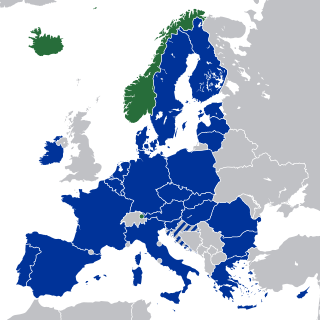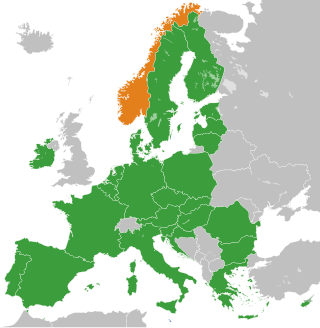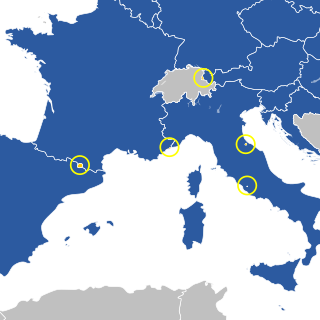
The European Free Trade Association (EFTA) is a regional trade organization and free trade area consisting of four European states: Iceland, Liechtenstein, Norway and Switzerland. The organization operates in parallel with the European Union (EU), and all four member states participate in the European Single Market and are part of the Schengen Area. They are not, however, party to the European Union Customs Union.

The European Economic Area (EEA) was established via the Agreement on the European Economic Area, an international agreement which enables the extension of the European Union's single market to member states of the European Free Trade Association. The EEA links the EU member states and three EFTA states into an internal market governed by the same basic rules. These rules aim to enable free movement of persons, goods, services, and capital within the European single market, including the freedom to choose residence in any country within this area. The EEA was established on 1 January 1994 upon entry into force of the EEA Agreement. The contracting parties are the EU, its member states, and Iceland, Liechtenstein, and Norway. New members of EFTA would not automatically become party to the EEA Agreement, as each EFTA State decides on its own whether it applies to be party to the EEA Agreement or not. According to Article 128 of the EEA Agreement, “any European State becoming a member of the Community shall, and the Swiss Confederation or any European State becoming a member of EFTA may, apply to become a party to this Agreement. It shall address its application to the EEA Council.” EFTA does not envisage political integration. It does not issue legislation, nor does it establish a customs union. Schengen is not a part of the EEA Agreement. However, all of the four EFTA States participate in Schengen and Dublin through bilateral agreements. They all apply the provisions of the relevant Acquis.

The European Health Insurance Card (EHIC) is issued free of charge and allows anyone who is insured by or covered by a statutory social security scheme of the EEA countries, Switzerland, and the United Kingdom to receive medical treatment in another member state in the same way as residents of that state—i.e., free or at a reduced cost—if treatment becomes necessary during their visit, or if they have a chronic pre-existing condition which requires care such as kidney dialysis. The term of validity of the card varies according to the issuing country. Continued reciprocal healthcare access between the EU and the UK was agreed, and the UK issues a UK Global Health Insurance Card (GHIC) valid in the EU, but not other EEA countries.

The EFTA Court is a supranational judicial body responsible for the three EFTA members who are also members of the European Economic Area (EEA): Iceland, Liechtenstein and Norway.

A customs union is the principal area of robust formal agreement between the Principality of Andorra and the European Union (EU). Andorra borders two EU member states: France and Spain.

The EFTA Surveillance Authority (ESA) monitors compliance with the Agreement on the European Economic Area (EEA) in Iceland, Liechtenstein and Norway (the EEA EFTA States). ESA operates independently of the States and safeguards the rights of individuals and undertakings under the EEA Agreement, ensuring free movement, fair competition, and control of state aid.

Norway is not a member state of the European Union (EU). However, it is associated with the Union through its membership of the European Economic Area (EEA), signed in 1992 and established in 1994. Norway was a founding member of the European Free Trade Association (EFTA) in 1960, which was originally set up as an alternative to the European Economic Community (EEC), the main predecessor of the EU. Norway had considered joining both the EEC and the European Union, but opted to decline following referendums in 1972 and 1994. According to the European Social Survey conducted in 2018, 73.6% of Norwegians would vote 'No' in a referendum to join the European Union. Norway has two land borders with EU member states: Finland and Sweden.

Withdrawal from the European Union is the legal and political process whereby an EU member state ceases to be a member of the Union. Article 50 of the Treaty on European Union (TEU) states that "Any Member State may decide to withdraw from the Union in accordance with its own constitutional requirements".

Currently, all of the European microstates have some form of relations with the European Union (EU).
The EEA Joint Committee is an institution of the European Economic Area (EEA). It is composed of representatives of Iceland, Liechtenstein, Norway, and the European Union. Its main function is to approve the application of European Union directives and regulations in the three EEA states which are not EU members. Once approved by the Committee these modify the EEA Agreement and thus force the three EEA states to implement them. Its decisions are taken by consensus.

Relations between the Principality of Monaco and the European Union (EU) are primarily conducted through France. Through that relationship Monaco directly participates in certain EU policies. Monaco is an integral part of the EU customs territory and VAT area, and therefore applies most measures on excise duties and VAT. Monaco borders one EU member state: France. However this relationship does not extend to external trade. Preferential trade agreements between the EU and third countries apply only to goods originating from the customs territory – Monaco may not claim EU origin in this respect.

Brexit was the withdrawal of the United Kingdom (UK) from the European Union (EU) at 23:00 GMT on 31 January 2020. The UK is the only sovereign country to have left the EU. The UK had been a member state of the EU or its predecessor the European Communities (EC), sometimes of both at the same time, since 1 January 1973. Following Brexit, EU law and the Court of Justice of the European Union no longer have primacy over British laws. The European Union (Withdrawal) Act 2018 retains relevant EU law as domestic law, which the UK can amend or repeal.

On 29 March 2017, the United Kingdom (UK) invoked Article 50 of the Treaty on European Union (TEU) which began the member state's withdrawal, commonly known as Brexit, from the European Union (EU). In compliance with the TEU, the UK gave formal notice to the European Council of its intention to withdraw from the EU to allow withdrawal negotiations to begin.

Between 2017 and 2019, representatives of the United Kingdom and the European Union negotiated the terms for Brexit, the planned withdrawal of the UK from the EU. These negotiations arose following the decision of the Parliament of the United Kingdom to invoke Article 50 of the Treaty on European Union, following the UK's EU membership referendum on 23 June 2016.

As of January 2021, the United Kingdom's post-Brexit relationship with the European Union and its members is governed by the Brexit withdrawal agreement and the EU–UK Trade and Cooperation Agreement. The latter was negotiated in 2020 and has applied since 2021.

The Brexit withdrawal agreement, officially titled Agreement on the withdrawal of the United Kingdom of Great Britain and Northern Ireland from the European Union and the European Atomic Energy Community, is a treaty between the European Union (EU), Euratom, and the United Kingdom (UK), signed on 24 January 2020, setting the terms of the withdrawal of the UK from the EU and Euratom. The text of the treaty was published on 17 October 2019, and is a renegotiated version of an agreement published half a year earlier. The earlier version of the withdrawal agreement was rejected by the House of Commons on three occasions, leading to the resignation of Theresa May as Prime Minister and the appointment of Boris Johnson as the new prime minister on 24 July 2019.
In British politics, the "Norway-plus model" was a proposal for a post-Brexit settlement, which the British government did not pursue. Proposed in November 2018 as an alternative to the Chequers plan, it would have consisted of membership of the European Free Trade Association (EFTA) and of membership of the European Economic Area (EEA) as an EFTA member state, combined with a separate customs union with the EU to create a trade relationship similar to that between the EU and its member states today, with the exception of the political representation in the EU's bodies. Michel Barnier, the EU's Chief Negotiator, has always said that a model that combined EEA/EFTA and a customs union was one that he would be happy to consider.

A no-deal Brexit was the potential withdrawal of the United Kingdom (UK) from the European Union (EU) without a withdrawal agreement. Under Article 50 of the Maastricht Treaty, the Treaties of the European Union would have ceased to apply once a withdrawal agreement was ratified or if the two years had passed since a member state had indicated its will to leave the European Union. The two-year period could have been extended by unanimous consent from all member states, including the member state that was wishing to leave the European Union.

This article outlines the predicted impact of Brexit, the withdrawal of the United Kingdom (UK) from the European Union (EU) and the European Atomic Energy Community.
In the wake of the referendum held in the United Kingdom on 23 June 2016, many new pieces of Brexit-related jargon entered popular use.
















